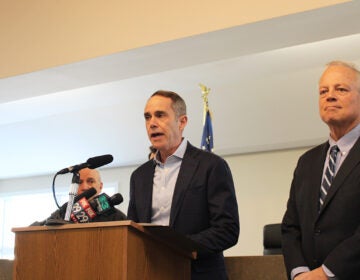A lawsuit, lines and calls for patience: Suburban Pa. congressional races
Pennsylvania’s competitive congressional races remain unresolved as of Tuesday night.

Bucks County Congressman Brian Fitzpatrick (left) and Ivyland Borough Councilmember Christina Finello. (AP Photo and Emma Lee/WHYY)
As county boards of elections move to count a mountain of mail-in ballots, Pennsylvania’s competitive congressional races remain unresolved as of Tuesday night.
In the Philadelphia suburbs, only the 1st District, which is mainly in Bucks County, was expected to be close. Election returns trickled in, with only 14% of votes tallied as of midnight. Earlier in the evening, voters stood in long lines, reportedly up to three or four hours, to cast ballots after the sun went down.
Two-term Republican incumbent Brian Fitzpatrick faces Democratic challenger Christina Finello.
Fitzpatrick ran for the seat in 2016 after his brother Mike announced he would not run for reelection. Mike Fitzpatrick passed away of cancer in January of this year. The younger Fitzpatrick, a former special supervisory agent for the FBI, has far outraised his opponent, with receipts totalling $3.8 million to Finello’s $1.8 million, according to Federal Election Commission disclosures.
Finello, a lawyer and clinical psychologist by training, has served on the Ivyland Borough Council since 2017. Her campaign issues include lower prescription drug prices, funding Planned Parenthood, making college more affordable, banning assault-style rifles and reestablishing diplomatic relations abroad.
Around 8:30 p.m., Finello gave a speech via Facebook live. At that time, Pennsylvania wasn’t reporting any returns for Bucks County, so it focused not on victory or concession, but urged patience.
“We need to let the hardworking public servants of Bucks and Montgomery county complete their duties,” she said. “Do not fret if early results from Election Day, in-person votes, tell one story. That’s not the whole picture.” Around 400,000 votes were cast in the race, about half of which were mail-in ballots, said Finello.
The most competitive race in the commonwealth is the 10th District, in Central Pennsylvania. Republican U.S. Rep. Scott Perry ended the night leading challenger Democratic Auditor General Eugene DePasquale, with just over half of the votes counted. Perry first went to serve in Congress in 2012, after serving in the Pennsylvania state house.
A staunch supporter of President Donald Trump, Perry is a member of the House Freedom Caucus and has voted against a $3 trillion coronavirus relief package which passed the House in May, but has not advanced in the Senate.
DePasquale, who previously held positions with the City of York and as a state representative, became Pennsylvania Auditor General in 2013. In that role, he serves as the fiscal watchdog for the state government, auditing spending from school districts to emergency services.
As one of the most contested races in the country, money has flowed in for both candidates. DePasquale has a slight edge in terms of funds raised, with $3.78 million raised over the cycle to Perry’s $3.54 million. Once a solidly Republican area, voter registration has also tightened as demographic shifts occur and district boundaries were redrawn. As of the day before the election, there were 233,711 registered Republicans, 211,277 registered Democrats and 84,672 registered independents residing in the district.
Matt Cartwright, a northeast Pennsylvania Democrat who won in 2018 in counties that swung for Trump in 2018, is in a competitive district that is now rated “leans Democrat.” He trailed opponent Jim Bognet Tuesday evening.
Connor Lamb, who represents suburbs northwest of Pittsburgh, and Susan Wild, serving the Lehigh Valley, are also Democratic incumbents in districts that could be in play, although are currently predicted to stay in their hands. Both Lamb and Wild ended November 3 behind their Republican opponents, Sean Parnell and Lisa Scheller, with much of the vote-counting left to do.
Pennsylvania’s suburban districts, save the 1st, are now seen as safe for Democrats. Following a Pennsylvania Supreme Court decision which mandated district lines be redrawn, Democrats swept suburban congressional races in 2018. That year was marked by a slate of women candidates, including the now Democratic U.S Reps Madeleine Dean (Montgomery County), Mary Gay Scanlon (Delaware County), and Chrissy Houlahan (Chester County), often seen as a rebuke to President Donald Trump. Nationwide, Democrats hoped to increase their numbers in the House, while Republicans aimed to make up lost ground.
Suburban county officials predicted it would take at least a couple of days for initial mail-in ballots to be counted.
Dean’s opponent, Kathy Barnette, filed a suit against Montgomery County election officials on Tuesday, accusing officials of “illegally pre-canvassing,” or beginning the process of evaluating mail-in ballots before counting, and in 1,2000 cases flagging ballot errors. The county allegedly then allowed those voters to correct their errors, resulting in the “disparate treatment of voters” under the 14th Amendment.
County officials refuted that stance, saying everything they did is within the bounds of the state election code.
“What we did is what we’ve always done, we allowed voters to correct any deficiencies to their ballot. If there was a signature missing, privacy envelope not there, we allowed them to correct that,” said Montgomery County Board of Elections Chair Ken Lawrence during a press conference Tuesday evening.
He also said it’s not 1,200 votes that would be affected as the lawsuit states, just 49. The outcome is unlikely to sway the outcome of that race, where Dean has a sizable lead.
A hearing is scheduled for 9 a.m. Wednesday. Clay D. Breece of Berks County also signed onto the lawsuit.

Get daily updates from WHYY News!
WHYY is your source for fact-based, in-depth journalism and information. As a nonprofit organization, we rely on financial support from readers like you. Please give today.






